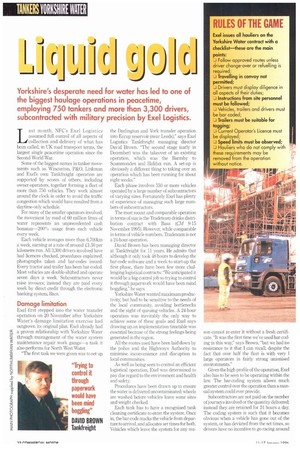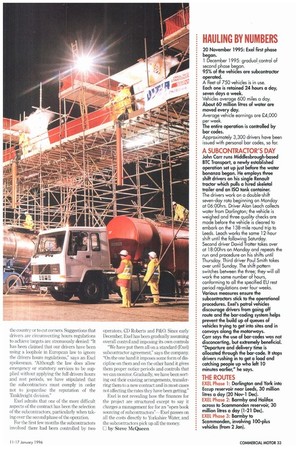111 r.:d
Page 44

Page 45

If you've noticed an error in this article please click here to report it so we can fix it.
Yorkshire's desperate need for water has led to one of the biggest haulage operations in peacetime, employing 750 tankers and more than 3,300 drivers, subcontracted with military precision by Exel Logistics.
Last month, NFC's Exel Logistics assumed full control of all aspects of collection and delivery of what has been called, in UK road transport terms, the largest single peacetime operation since the Second World War.
Some of the biggest names in tanker movements such as Wincanton, MO, Linkman and Exel's own Tankfreight operation are supported by scores of others, including owner-operators, together forming a fleet of more than 750 vehicles. They work almost around the clock in order to avoid the traffic congestion which would have resulted from a daytime-only schedule.
For many of the smaller operators involved, the movement by road of 60 million litres of water represents an unprecedented cash bonanza-200% usage from each vehicle every week.
Each vehicle averages more than 6.700km a week, earning at a rate of around LL50 per kilometre run. All 3,300 drivers involved have had licences checked, procedures explained, photographs taken and bar-codes issued. Every tractor and trailer has been bar-coded. Most vehicles are double-shifted and operate seven days a week. Subcontractors never raise invoices; instead they are paid every week by direct credit through the electronic banking system, Bacs.
Damage limitation
Exel first stepped into the water transfer operation on 20 November after Yorkshire Water's damage limitation exercise had outgrown its original plan. Exel already had a proven relationship with Yorkshire Water through management of the water system maintenance repair work gangs—a task it also performs for North West Water.
"The first task we were given was to set up the Darlington and York transfer operation into Eccup reservoir (near Leeds)," says Exel Logistics Tankfreight managing director David Brown. "The second stage (early in December) was the takeover of an existing operation, which was the Barmby to Scammonden and Halifax run. A set-up is obviously a different thing to taking over an operation which has been running for about eight weeks."
Each phase involves 350 or more vehicles operated by a large number of subcontractors of varying sizes. Fortunately Exel has plenty of experience of managing such large numbers of subcontractors.
The most recent and comparable operation in terms of size is the Tradeteam drinks distribution contract with Bass (CM 9-15 November 1995). However, while comparable in terms of vehicle numbers, Tradeteam is not a 24-hour operation.
David Brown has been managing director at Tankfreight for 11 years. He admits that although it only took 48 hours to develop the bar-code software and a week to start-up the first phase, there have been few more challenging logistical contracts: We anticipated it would be a big control job so trying to control it through paperwork would have been mind boggling." he says.
Yorkshire Water wanted maximum productivity, but had to be sensitive to the needs of the local community, avoiding bottlenecks and the sight of queuing vehicles. A 24-hour operation was inevitably the only way to achieve some of these goals and Exel says drawing up an implementation timetable was essential because of the strong feelings being generated in the region.
All the routes used have been laid down by the police and the Highways Authority to minimise inconvenience and disruption to local communities.
As well as being seen to control an efficient logistical operation, Exel was determined to pay due regard to the environment and health and safety.
Procedures have been drawn up to ensure the water is delivered uncontaminated: wheels are washed before vehicles leave some sites and weight checked.
Each tank has to have a recognised tank cleaning certificate to enter the system. Once in, the bar-code tracks the vehicle from departure to arrival, and allocates set times for both. Vehicles which leave the system for any rea
son cannot re-enter it without a fresh certificate. "It was the first time we've used bar-coding in this way," says Brown, "but we had no resistance to it that I can recall, despite the fact that over half the fleet is with very 1 large operators in fairly strong unionised environments."
Given the high profile of the operation. Exel also has to be seen to be operating within the law. The bar-coding system allows much greater control over the operation than a manual system could ever provide.
Subcontractors are not paid on the number of journeys involved or the quantity delivered; instead they are retained for 24 hours a day. The coding system is such that it becomes obvious when a vehicle has gone out of the system, or has deviated from the set times, so drivers have no incentive to go racing around
the country or to cut corners. Suggestions that drivers are circumventing hours regulations to achieve targets are strenuously denied: it has been claimed that our drivers have been using a loophole in European law to ignore the drivers hours regulations," says an Exel spokesman. "Although the law does allow emergency or statutory services to be supplied without applying the full drivers hours and rest periods, we have stipulated that the subcontractors must comply in order not to jeopardise the reputation of the Tankfreight division."
Exel admits that one of the more difficult aspects of the contract has been the selection of the subcontractors, particularly when taking over the second phase of the operation.
For the first few months the subcontractors involved there had been controlled by two Operators, CD Roberts and P&O. Since early December, Exel has been gradually assuming overall control and imposing its own controls "We have put them all on a standard (Exel) subcontractor agreement," says the company. "On the one hand it imposes some form of discipline on them and on the other hand it gives them proper notice periods and controls that we can monitor. Gradually, we have been sorting out their existing arrangements, transferring them to a new contract and in most cases not affecting the rates they have been getting" Exel is not revealing how the finances for the project are structured except to say it charges a management fee for an "open book
sourcing of subcontractors'' Exel passes on all the costs directly to Yorkshire Water, and the subcontractors pick up all the money. rl by Steve McQueen












































































































